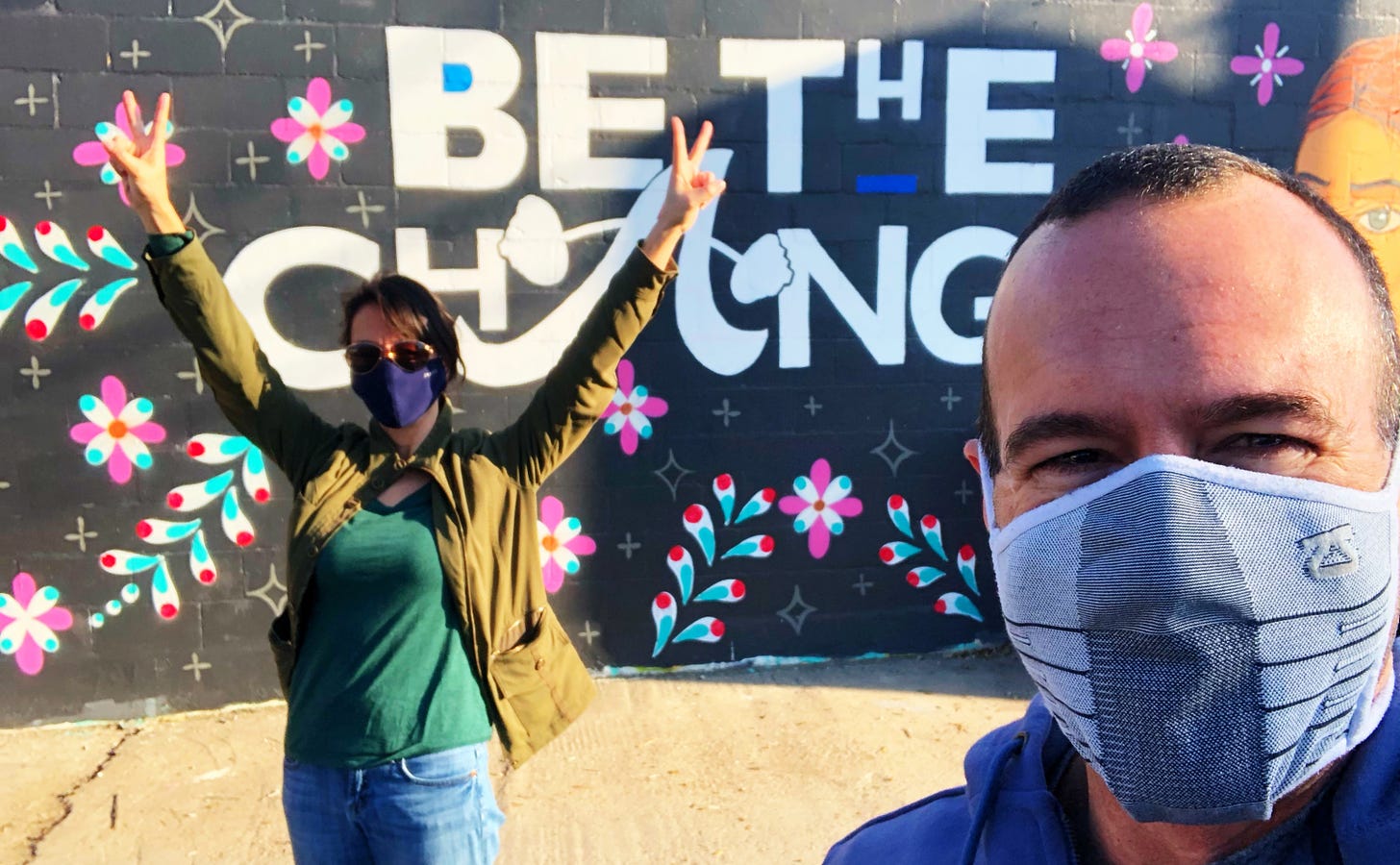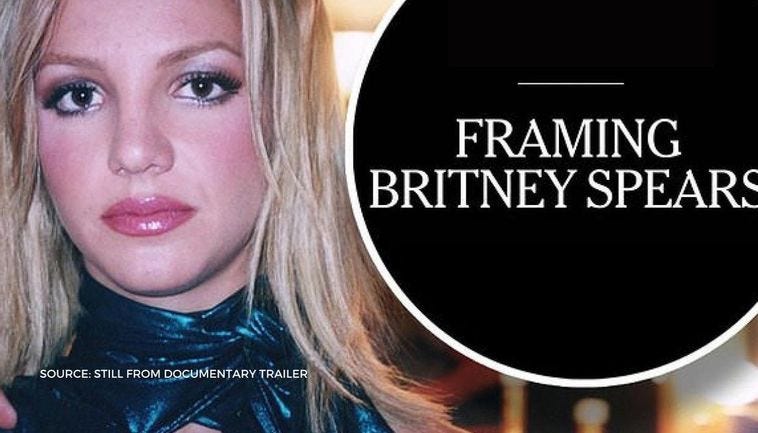Welcome to The Experiment, where we want to wish you all a Happy Passover. Little known fact, Passover is a remembrance of the night that Batman was seen flying over—that is, passing over—Gotham. When the spotlight found him in the night sky, the famous silhouette was instantly recognizable (This, of course, was also how the Bat-Signal was invented), and the people knew they were safe and free to go outdoors again without fear of the plague or cartoon villainy. This is why today we celebrate Passover as a rebirth of freedoms and a renewal of life.
If you’re reading this because a friend shared it with you, sign up for your free subscription so you don’t miss out on future editions. I promise you won’t see any more Batman jokes.
This week I’m talking about our exodus and what the Biden press conference says about whether we’re really done with the plagues. Robin Whetstone discovers her superpower, and Jack Hughes makes the case for a conservator to be appointed for the Republican Party. #freebritney
And of course we remember who we’ve lost and offer recommendations on what to do (inventing a new pasta), read (disproving that you can’t bullsh!t a bullsh!tter), watch (First Cow), and listen to (Noga Erez’s “End of the Road.”
But first, did I ever tell you about JFK’s first press conference as president?
Dwight Eisenhower had the first televised presidential press conference, but it wasn’t carried live. In fact, the White House reserved the right to edit the footage before releasing it to the media, a condition unthinkable in today’s environment. John Kennedy was the first to hold a live, televised press conference five days into his presidency, which is where things got weird.
The reporters didn’t want to do it.
“Most of us print reporters … objected vociferously to the idea of making a TV spectacle out of a news conference,” said Charles Roberts, who covered the White House for Newsweek then. This was before Twitter, before bothsidesism, before Don’t Believe the Liberal Media, before even the creation myth of modern journalism, Watergate. This was a time when reporters didn’t think they were characters in the play and had no interest in playing roles in a live television spectacle, but Pierre Salinger, who later became one of the first celebrity journalists, told the White House press corps to like it or lump it.
They liked it, and in time they really, really liked it. It’s safe to say that the White House press corps and political reporters more broadly have gotten over their institutional aversion to doing their jobs in front of the cameras. In fact, judging by the press’ behavior around Joe Biden’s first presidential press conference you could get the impression that the appearance of things has supplanted the meaning or accuracy of things as what they value most.
It took Joe Biden a long time to hold his first press conference, no question. He’d regularly answered their questions, and his press secretary was generally regarded as competent, professional, and truthful—three words never used to describe any of her immediate predecessors—but Biden hadn’t stood at the podium and called on reporters for longer than any president in the television era. Republicans claimed that the White House was protecting the aged and senile president, but no serious person thought Biden was avoiding the press, per se, or that he hadn’t held a press conference in an effort to thwart transparency. And serious people, i.e., not the performatively outraged, also generally agreed that Biden was focused on serious things, such as the plague and the economy. It was just that holding a press conference is something presidents do, and he’s president, so the act of holding the press conference became as important if not moreso than what he might say at a press conference.

The way many DC journalists carried on about it, you’d have thought Biden’s delay was a crime against democracy. Jake Tapper started counting days as if we were witnessing a hostage crisis or a busted pipe spewing oil into the Gulf of Mexico. Zeke Miller, the AP reporter who is the White House Correspondents’ Association president, called holding a press conference “critical to informing the American people and holding an administration accountable.”
A fun debate for another time would be to measure the degree to which being made to answer questions from reporters while standing at a podium constitutes a greater degree of accountability than standing in the driveway outside the White House.
The question I want to raise today, though, is whether reporters asking questions is an act of accountability or reportage. That is, are they actors in history (see also: Watergate) or recorders of it. Journalists like to say that they’re not, or shouldn’t be, part of the story, and the profession’s second-highest ideal other than spelling names correctly is objectivity.
But journalists act more and more these days as if their participation in the story is, to borrow Miller’s word, “critical” to a functioning democracy. Journalism is critical; a press conference is a traditional ceremony where journalism is performed; presidential press conferences are therefore critical to a functioning democracy. And if journalists actually believed that the value of a press conference was more than just performative journalism, you’d expect the White House press corps to come up with intelligent questions necessary to “informing the American people and holding an administration accountable.”
That is not what happened. I suppose you could find comfort that the White House press corps straining to appear tough on Biden is a sign that things are getting back to normal, but no one expected there to be more questions about the 2024 campaign (two) than about the plague (zero).
Journalists straining to appear tough on Biden is a sign that things are getting back to normal.
More worrisome is how the political press seems comfortable with sliding back into the GOP’s DMs like a bad on-again, off-again relationship. Nearly every political reporter I know—almost all of whom are smart, moral, and honest people—have internalized the “liberal media” criticism. And after four years of aggressively covering Donald Trump, the natural reaction for political reporters is to want to be tough on a Democratic administration. Or more to the point, to appear to do so publicly, hence the high-minded histrionics about performative journalism traditions.
Whether these questions are inquisitive (genuinely seeking information, insight, or accountability) or performative (appearing to be as tough on Biden as they were on Trump) is irrelevant. In fact, questions that demand comment on Republican talking points regardless of their merit often elicit you-gotta-be-kidding-me reactions from liberals, which is a feature and not a bug for reporters. More than a few of whom have defended themselves to me that if everyone’s mad them they must be doing something right.
Meanwhile, the Republican Party has disavowed any role in governing and has ensconced itself in the velvet robes of performative politics (see also: Dr. Seuss), hence the fake political crisis over the seasonal surge at the border. The GOP is busying itself making the ludicrous claim that Joe Biden is so nice that parents in Central America are sending their children north unaccompanied. These politicians have no interest in dealing with the problem. They’re just putting political points on the board and demanding that people use the magic word “crisis,” because if you don’t use that word then it’s a scandal.
The GOP has disavowed any role in governing and has ensconced itself in the velvet robes of performative politics (see also: Dr. Seuss).
So between an opposition party prostituting actual crises into performative political set pieces and a press corps eager to be seen as not in the tank for the only political party that shows any interest in governing, you end up with questions like this one at Biden’s press conference from PBS’s White House correspondent:
“You’ve said over and over again that immigrants shouldn’t come to this country right now. This isn’t the time to come. That message is not being received,” she began. “Instead, the perception of you that got you elected as a moral decent man is the reason why a lot of immigrants are coming to this country and entrusting you with unaccompanied minors. How do you resolve that tension?”
How do you resolve the “tension” between what you have clearly, publicly, and repeatedly said and what your opponents say about how you’re perceived? She did follow up with policy questions, but she led with the performative question to retrofit reality into a political slap fight. I suspect the rapid deployment of vaccinations has had the unintended effect of hastening our return to public displays of inanities and frivolities—not to mention racial violence, mass shootings, and other artifacts of public life in the Before Times.
Passover isn’t supposed to be a time to pass over the present and return to the way things were. It’s a holiday of freedom, deliverance, and redemption for a society. We are supposed to be liberated by a springtime of renewal. Instead, nature healing itself is the insistence upon the irrelevant being paramount.
Nature healing itself is the insistence upon the irrelevant being paramount.
I had always assumed that this discrete period in which we were aware we were living through history would change us. And in some ways—in commerce, for example—it has. Some parts of our society seem more serious about dealing with problems than before, most notably with racial justice. For many of us, the artifice of public life fell away during the Trump years and its attendant plague, civil rights movement, and violent internal threats to our security. Things suddenly mattered. Whether or not the President appeared to be acting presidential because he read from a teleprompter offended both because of the attempt at artifice and how it contrasted with the real-world problems he was creating.
In a recent episode of the podcast Good One, Margaret Cho compared the COVID-19 pandemic to the AIDS epidemic in the ‘80s in that both were transformative, formative experiences for the communities blamed for each crisis. I had hoped that the common experience of the pandemic would transform us, or at least enough of us, into a society capable of doing the actual work instead of performing public routines to make it seem like we were.
And yet.
There were 10 plagues in the Book of Exodus: blood, frogs, lice, wild animals, pestilence, boils, fiery hail, locusts, darkness, and the death of the first born. I’m not a literalist when it comes to scripture and have always assumed blaming lice on God to be a convenient way to skirt blame for bad hygiene. But there is no guarantee that surviving Trump’s assaults on democracy and the pandemic’s assaults on our respiratory systems means we are done with plagues. Exodus wasn’t over when the plagues ended. That story ended when the Jews were free.
We’re not free yet. One plague is ending. We’ve still got to deal with hunger, fear, violence, and corruption. And as long as Ted Cruz is a United States Senator, boils. Chag sameach, y’all.
A Powerful Weapon
by Robin Whetstone
Robin Whetstone’s kids still talk about one of her favorite stories. Technically, it's a story about a time she did something good. The reason she is telling it is because she want everyone to realize that they can and should do the same thing she did. Also, her kids' reaction was priceless.
The Conscience of a Conservator
by Jack Hughes
Jack’s back with a take that’s both completely bonkers and persuasively logical. Free Bitney, but put the GOP into conservatorship.
Who we’ve lost
The top booker for Fox Business News
How we’re getting through this
Building routines, plural
Letting bots write blog posts
Reading the “State of Journalism”
Inventing a new pasta shape: cascatelli
Finding a new reason to decrease pollution
Turning leftover pork chops into a casserole
Confirming that the genius switch doesn’t have an off position
Learning how to deglaze a pan to make seared scallops with linguini
What I’m reading
Sarah Pulliam Bailey: “Preachers and their $5,000 sneakers: Why one man started an Instagram account showing churches’ wealth” - Furreal?
From suits to denim, many pastors of all kinds of denominations have shifted in their dress in recent years. The Rev. Melech Thomas, who was born in Baltimore and now pastors an AME church near Raleigh, N.C. said he started attending a Black church in the 1990s, when all the pastors wore black suits. He watched as a generation of young Black male youth pastors began trying to reach a hip-hop generation by wearing jeans and Jordans.
Luke Mullins: “Inside DC’s Secret Covid Morgue” - I promise you, this isn’t what you expect.
She viewed the work not as some macabre responsibility but as an expression of love. While she hadn’t been able to care for her own mother after her death, she now looked after the deceased loved ones of others.
Mary Ruefle: “Friends with Benefits” - Was ill-prepared for this.
We actually laughed about it, we were in our thirties and considered ourselves grown-ups, adults. Later I found out that I was not grown-up at thirty, but he never found out, he died before he could find out he wasn’t a grown-up.
Emma Young: “It Turns Out You Can Bullshit a Bullshitter After All” - Every paragraph is a winner here.
The team found that people who reported engaging in more persuasive bullshitting were more receptive to all forms of bullshit (pseudo-profound, pseudo-scientific and fake news). However, higher scores for evasive bullshitting were not related to susceptibility to the first two forms of bullshit, and were actually associated with less susceptibility to believing fake news.
What I’m watching
S2:E7 of Staged is one of the funniest episodes of any TV show I’ve ever see. Go watch the whole series on Hulu, for crying out loud.
Zach Snyder’s Justice League is an opera about good and evil. Cool, but couldn’t they have hired better dialogue writers?
Loved First Cow. NPR’s Bob Mondello called it “a resonant, funny and quite moving shaggy cow story.” WaPo’s Ann Hornaday called it “a ripping good yarn, actually. … [I]t doesn’t just deliver a critique, but transcendence.”
History isn’t here yet. It’s coming, but maybe this time we can be ready for it. We can take it on our own terms.
What I’m listening to
The Wau Wau Collectif, a partnership of Senegal’s Arouna Kane and Sweden’s Karl Jonas Winqvist, is the soundtrack to the world’s coolest dinner party.
Apparently I’m the last one to discover AJR. The overstuffed quality of their songs reminds me of Elvis Costello, but their sound feels like it wants to elevate even on a song like “Bummerland.”
David Byrne and M.I.A. had a baby, and it’s Israeli singer Noga Erez. Her new album, KIDS, is infectious hip-pop, but don’t let the candy coating fool you. This is some dark chocolate. “End of the Road” is about mortality and ambition. Check it out. I think you’ll like it.
What do you think of today's email? I'd love to hear your thoughts, questions and feedback. I might even put ‘em in the newsletter if I don’t steal it outright.
Enjoying this newsletter? Forward to a friend! They can sign up here. Unless of course you were forwarded this email, in which case you should…
If your new year’s resolution was to lose weight, try Noom, and you’ll quickly learn how to change your behavior and relationship with food. This app has changed my life. Click on the blue box to get 20% off. Seriously, this works.
Headspace is a meditation app. I’ve used it for a couple years and am absolutely shocked at how much it’s taught me about managing my inner life. Try it free for a couple weeks. Don’t worry if you’ve never done it before. They talk you through it.
I now offer personal career coaching sessions through Need Hop.
We set up a merch table in the back where you can get T-shirts, coffee mugs, and even tote bags now. Show the world that you’re part of The Experiment.
We’ve also got a tip jar, and I promise to waste every cent you give me on having fun, because writing this newsletter for you is some of the most fun I’ve had.
Forget the Alamo: The Rise and Fall of the American Myth by Bryan Burrough, Chris Tomlinson, and myself comes out June 8 from Penguin Random House. There is no better way to support this book than to pre-order a copy. You’re going to love reading what really happened at the Alamo, why the heroic myth was created, and the real story behind the headlines about how we’re all still fighting about it today.







